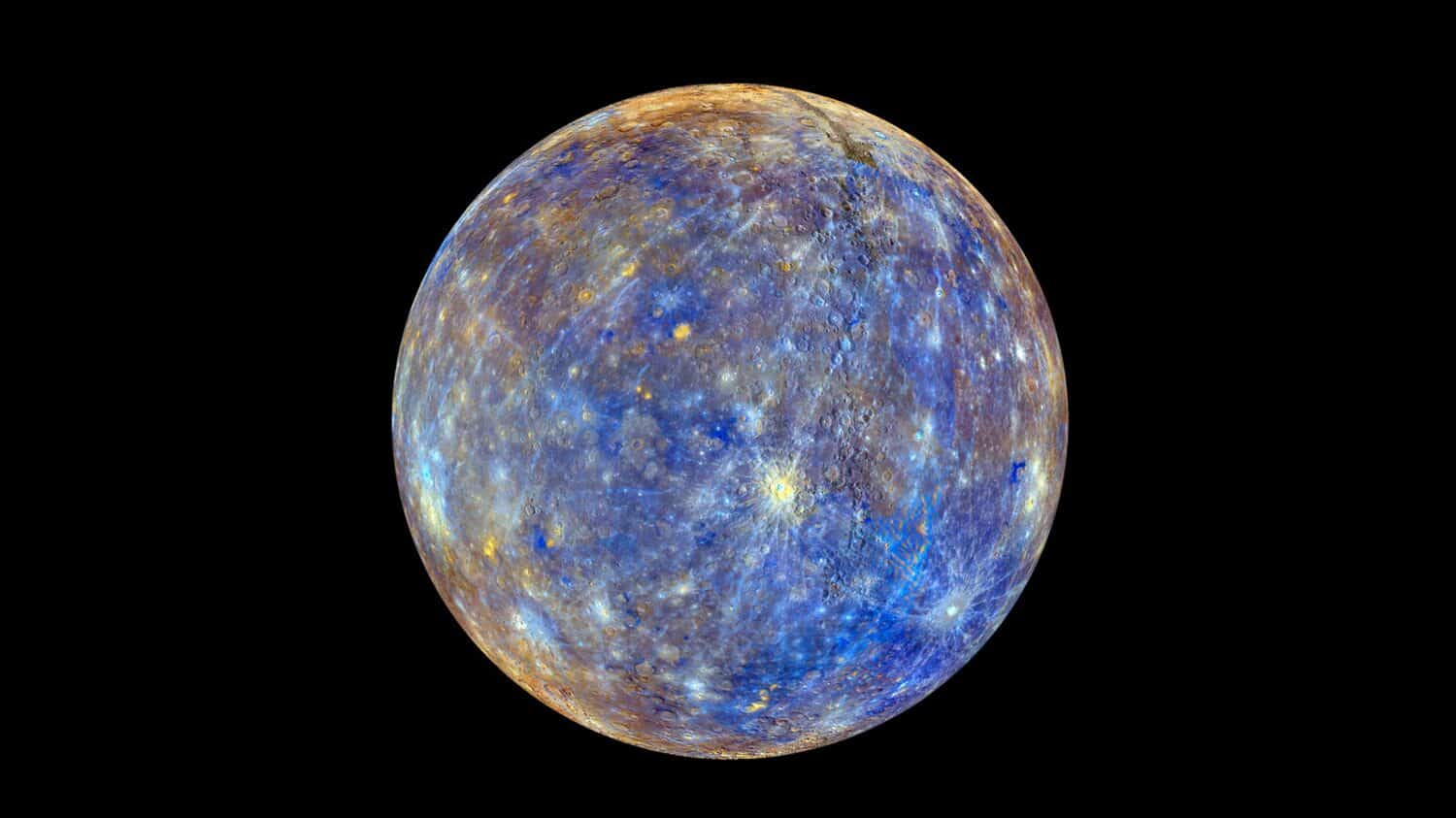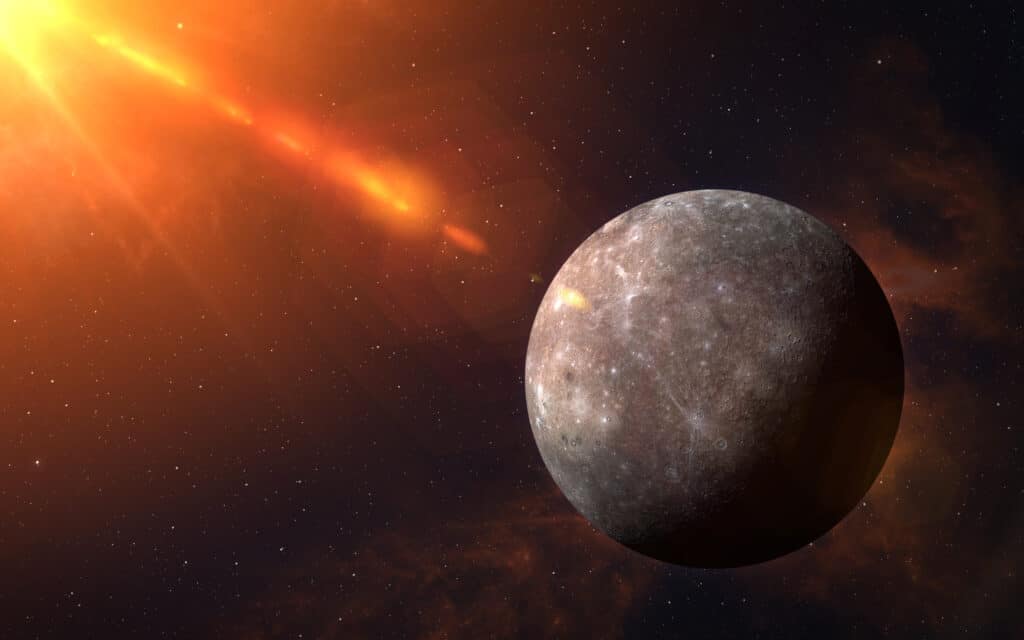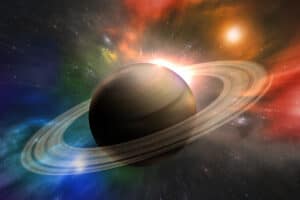Long before the invention of telescopes, ancient civilizations gazed up at the night sky and named the stars and planets they observed. The ancient Romans identified the sun, moon, and five bright planets and named them after their most revered gods. They gave Mercury, the fastest-moving planet in the night sky, the same name as the messenger god, who was the patron of travelers and traveled around the world with his winged sandals.
While we don’t know exactly who first discovered Mercury and gave the first planet in the solar system its name, here’s what we know about its origins and history.

The planet Mercury orbits the Sun in a speedy 88 days.
©Claudio Caridi/Shutterstock.com
How Did Mercury Get Its Name?
In ancient times and to this day, astronomers carry a tradition of naming objects in the sky after mythological figures. Mercury was named after the Roman god of the same name.
In Roman mythology, Mercury was the messenger who flew around on behalf of the rest of the pantheon. He also was considered the patron deity of travel, communication, and trade, overseeing relationships between different cultures.
The planet is closest to the sun and completes its fast orbit in a speedy 88 days, nearly a third of the time it takes for Venus, the second-closest planet, to complete a year. The Romans associated its fast speed with the swift-traveling Mercury, who flew across the land with a winged hat and sandals.

Mercury, or Hermes, flew around the world with winged sandals as the gods’ messenger.
©Al Zakh/Shutterstock.com
Who Discovered Mercury?
Mercury is one of five planets visible to the naked eye, not including the moon and sun. Many prehistoric civilizations likely observed Mercury in the ancient night sky. One of the earliest discovered records, though, was on the Mul.Apin tablets. An ancient Assyrian astronomer in the 14th century B.C. gave it a name that translates roughly to “the jumping planet.” The first person to record the planet’s name, however, was the Greek astronomer Timocharis in 265 B.C.
Greek astronomers initially believed that the west and east appearances of Mercury, which showed up in different elongated shapes in the sky, were two separate objects. They named these planets Hermes in the western sky and Apollo in the east. However, they later discovered that Mercury was a single entity and left it with the name Hermes. Hermes was the messenger of the gods who announced dawn and dusk, which made it a fitting name for the fast-moving planet. Mercurius — Mercury — is the Latinized version of Hermes.
While the Greeks first named the planet, the ancient Egyptians were the people to discover that Sabkou — their name for Mercury — rotated around the sun. Nordic peoples also saw the planet and called it Woden for the god Odin, who traveled like Hermes to the underworld Hel. The word is the same from which we get the name “Wednesday” or Woden’s (Odin’s) Day.
In the 17th century, however, astronomers first observed Mercury through a telescope. While Galileo first spotted it through a crude early version of the telescope, the Italian Zupus was the first to observe the planet’s phases in 1693. Later, astronomers could chart out its transit, observe surface markings, and measure its approximate rotation.

Mercury is one of the five planets visible to the naked eye. These image elements are furnished by NASA.
©iStock.com/buradaki
Mercury’s Original Name
Many civilizations espied Mercury in the night sky, so there’s no one original name we can assign to the planet. Different cultures named it after important gods in their pantheons, but Mercury — the Roman messenger god — was the one that stuck with scientists to this day.
The ancient Egyptians called the plant Sabkou, and the Norse people and Viking tribes called the planet Woden for the god Odin. There’re also records of Babylonian writings referring to the planet as Nabu in the early first millennium B.C.

The planet Mercury is closest to the sun, with a thin atmosphere, slow rotation, and speedy orbit.
©19 STUDIO/Shutterstock.com
Mercury Facts
Mercury is an interesting planet with several unique traits compared to other entities in our solar system. It’s the only planet with no moons in our sky and has a thin atmosphere that makes it challenging to observe from here on Earth. Recent spacecraft missions such as the Mariner 10 probe and MESSENGER were able to fly by and orbit the planet, sending data back home for us to learn from.
Mercury’s proximity to the sun makes its surface a scorcher, with temperatures reaching up to 430 degrees Celsius. Its thin atmosphere can’t distribute the heat to the rest of the planet, leading to start temperature differences between the sunny and night side of the planet. Mercury gets down to a chilly -180 degrees Celsius when it doesn’t face the sun.
Interestingly, the parts of the planet that are shaded from the sun’s intense gaze hold some permanent ice deposits. But despite the presence of water, life is an impossibility on Mercury.
Mercury is slightly bigger than Earth’s moon and 2.6 times smaller than Earth itself. The planet has the fastest orbit around the sun but one of the longest days due to its prolonged rotation. A single spin on Mercury’s axis takes the equivalent of 59 Earth days, but an orbit around the sun takes only 88 Earth days. This means that in three days on Mercury, two years have passed.
Thank you for reading! Have some feedback for us? Contact the AZ Animals editorial team.







